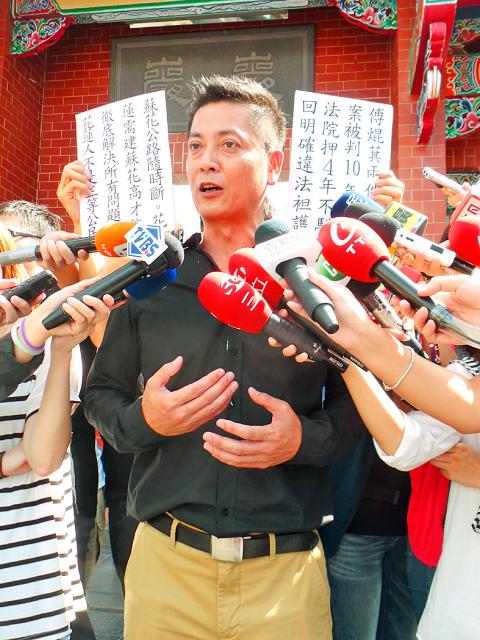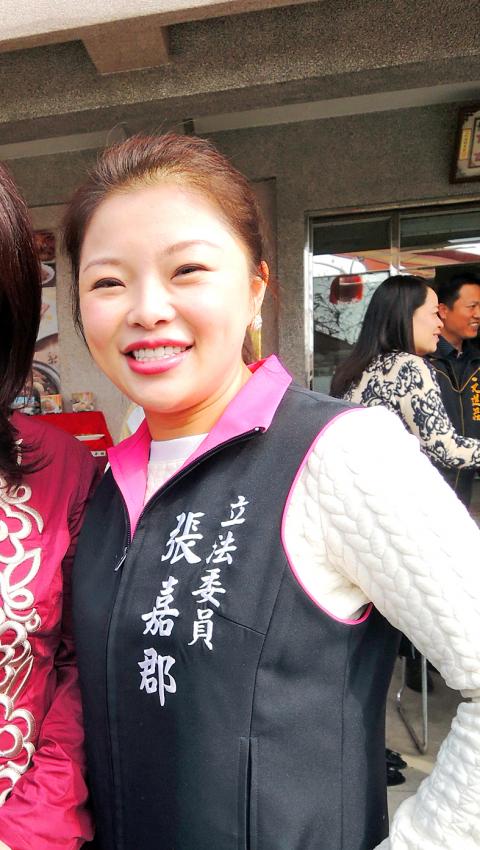Following former Chinese Nationalist Party (KMT) legislator Chang Sho-wen’s (張碩文) announcement of his withdrawal from the party on Monday, two KMT legislators yesterday threatened to do the same, with one saying the cross-strait policy of presumptive KMT presidential candidate Hung Hsiu-chu (洪秀柱) was the source of her misgivings.
Chang, who was also KMT Taipei mayoral candidate Sean Lien’s (連勝文) spokesperson during the campaign last year, released a statement on Monday announcing his withdrawal from the party.
He had said a day earlier that a ruling party “obsessed with a power struggle” is no longer worth supporting.

Photo: Kuo An-chia, Taipei Times
“I decided to leave the party to carry out more efforts that many people expect me to accomplish,” Chang said in the statement, adding that a political party should serve the public, rather than be “a fetter restricting individuals.”
Chang said that he left the party because he “came from the people, and as the KMT is now walking in the opposite direction from the people, I of course have to go back to the people.”
He is said to have planned to run for a legislative seat on the People First Party’s ticket, challenging Democratic Progressive Party (DPP) Legislator Gao Jyh-peng (高志鵬) in New Taipei City’s Sanchong District (三重).

Photo: Liao Shu-ling, Taipei Times
KMT Legislator Chi Kuo-tung (紀國棟), who failed to secure the party’s nomination to run in Taichung, said the KMT “has no regard for party members’ thoughts and deeds.”
After a high-level party member said that it is better to have the party lose members than to have members without a sense of identity, Chi said of course members should have a sense of party identity, but the party has to make itself worth identifying with.
“We do not need enemies when we have members aspiring for a smaller party,” Chi said.
When asked whether he would join the legislative race with another political party, Chi said it is too early to say, as the election is six months away.
However, he also underlined his resolution to run.
KMT Legislator Chang Chia-chun (張嘉郡) said she would consider withdrawing “if the party cannot be an open party, as it said it would be.”
Already nominated by the KMT to run for a third term in Yunlin County, Chang Chia-chun said there is strong opposition at the local level against Hung’s “one China, same interpretation.”
“I myself consider [Hung’s cross-strait policy] an idea that has gone off the track of the KMT’s consensus,” she said.
Chi agreed that Hung’s proposal has had “obvious impacts,” as “same interpretation and respective interpretations are miles apart.”
KMT Legislator Wu Yu-sheng (吳育昇) agreed that Hung has to adjust her cross-strait proposal so it would not harm the party’s legislative election prospects in central and southern Taiwan.
“I cannot blame Chang Chia-chun; I cannot even blame the DPP for categorizing Hung as a ‘unificationist,’” Wu said. “There will be pressure for Hung to make adjustments — and it will not be coming from the DPP, but from the KMT itself.”
Wu added that it is not difficult for Hung to make adjustments to her proposal, as the discussion for setting up reciprocal offices between the two sides of the Taiwan Strait has already been under way; the basic underlying logic of the measure is mutual recognition of one China, but employing different words for it, he said.
Hung simply has to revise the proposal “and make it consistent with the party’s” before July 19, the date of the party congress, Wu said.

The brilliant blue waters, thick foliage and bucolic atmosphere on this seemingly idyllic archipelago deep in the Pacific Ocean belie the key role it now plays in a titanic geopolitical struggle. Palau is again on the front line as China, and the US and its allies prepare their forces in an intensifying contest for control over the Asia-Pacific region. The democratic nation of just 17,000 people hosts US-controlled airstrips and soon-to-be-completed radar installations that the US military describes as “critical” to monitoring vast swathes of water and airspace. It is also a key piece of the second island chain, a string of

A magnitude 5.9 earthquake that struck about 33km off the coast of Hualien City was the "main shock" in a series of quakes in the area, with aftershocks expected over the next three days, the Central Weather Administration (CWA) said yesterday. Prior to the magnitude 5.9 quake shaking most of Taiwan at 6:53pm yesterday, six other earthquakes stronger than a magnitude of 4, starting with a magnitude 5.5 quake at 6:09pm, occurred in the area. CWA Seismological Center Director Wu Chien-fu (吳健富) confirmed that the quakes were all part of the same series and that the magnitude 5.5 temblor was

The Central Weather Administration has issued a heat alert for southeastern Taiwan, warning of temperatures as high as 36°C today, while alerting some coastal areas of strong winds later in the day. Kaohsiung’s Neimen District (內門) and Pingtung County’s Neipu Township (內埔) are under an orange heat alert, which warns of temperatures as high as 36°C for three consecutive days, the CWA said, citing southwest winds. The heat would also extend to Tainan’s Nansi (楠西) and Yujing (玉井) districts, as well as Pingtung’s Gaoshu (高樹), Yanpu (鹽埔) and Majia (瑪家) townships, it said, forecasting highs of up to 36°C in those areas

IN FULL SWING: Recall drives against lawmakers in Hualien, Taoyuan and Hsinchu have reached the second-stage threshold, the campaigners said Campaigners in a recall petition against Chinese Nationalist Party (KMT) Legislator Yen Kuan-heng (顏寬恒) in Taichung yesterday said their signature target is within sight, and that they need a big push to collect about 500 more signatures from locals to reach the second-stage threshold. Recall campaigns against KMT lawmakers Johnny Chiang (江啟臣), Yang Chiung-ying (楊瓊瓔) and Lo Ting-wei (羅廷瑋) are also close to the 10 percent threshold, and campaigners are mounting a final push this week. They need about 800 signatures against Chiang and about 2,000 against Yang. Campaigners seeking to recall Lo said they had reached the threshold figure over the